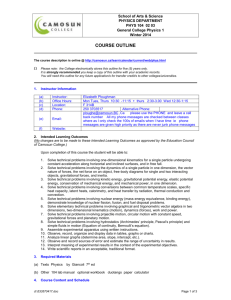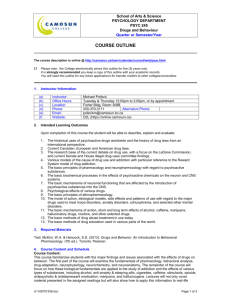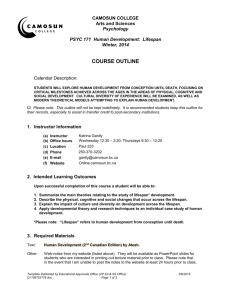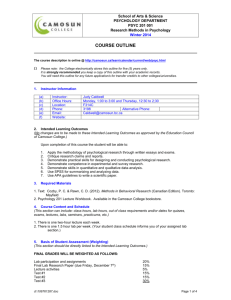PSYC-274-001 Cate Pelling
advertisement
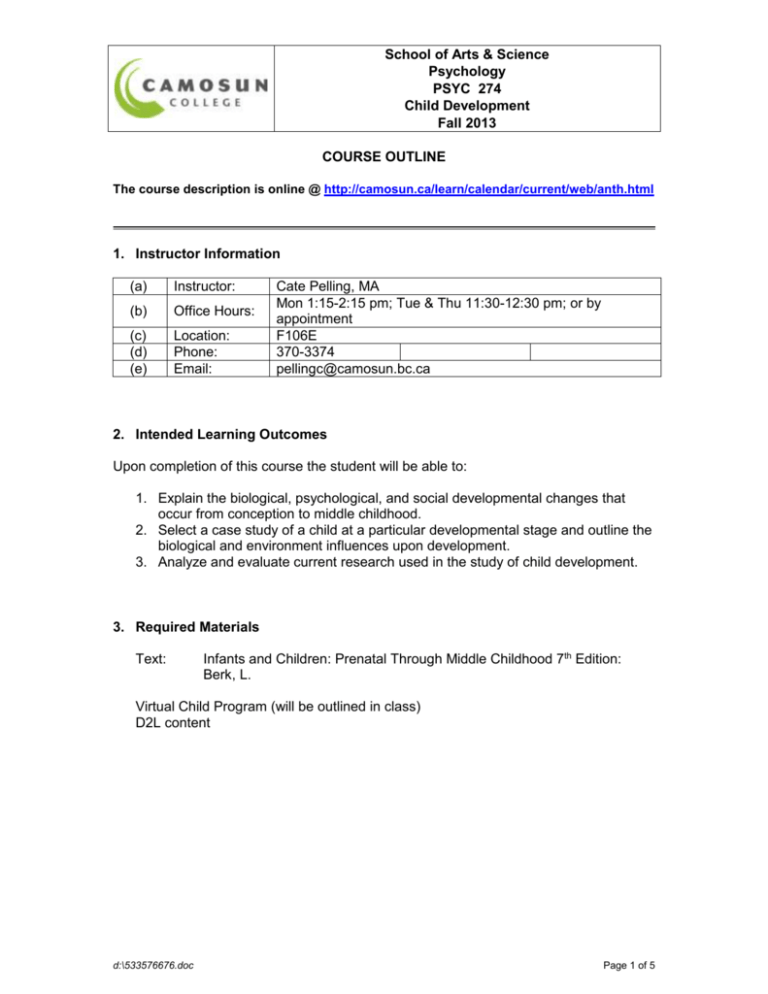
School of Arts & Science Psychology PSYC 274 Child Development Fall 2013 COURSE OUTLINE The course description is online @ http://camosun.ca/learn/calendar/current/web/anth.html 1. Instructor Information (a) Instructor: (b) Office Hours: (c) (d) (e) Location: Phone: Email: Cate Pelling, MA Mon 1:15-2:15 pm; Tue & Thu 11:30-12:30 pm; or by appointment F106E 370-3374 pellingc@camosun.bc.ca 2. Intended Learning Outcomes Upon completion of this course the student will be able to: 1. Explain the biological, psychological, and social developmental changes that occur from conception to middle childhood. 2. Select a case study of a child at a particular developmental stage and outline the biological and environment influences upon development. 3. Analyze and evaluate current research used in the study of child development. 3. Required Materials Text: Infants and Children: Prenatal Through Middle Childhood 7th Edition: Berk, L. Virtual Child Program (will be outlined in class) D2L content d:\533576676.doc Page 1 of 5 4. Course Content and Schedule Week Topic Sept. 5 Introduction, Course Outline Sept. 12 History, Theory and Research Genetic & Environmental Factors Chapters 1 & 2 Sept. 19 Prenatal Development Chapter 3 Sept. 26 Birth and the Newborn Baby Chapter 4 Oct. 3 Physical Development in Infancy and Toddlerhood Chapter 5 Oct. 10 Cognitive Development in Infancy and Toddlerhood Chapter 6 Oct. 17 Emotional and Social Development in Infancy and Toddlerhood Chapter 7 Oct. 24 Physical Development in Early Childhood Chapter 8 Field Assign #1 Oct. 31 Cognitive Development in Early Childhood Chapter 9 Test #2 (chapters 5-8) Nov. 7 Emotional and Social Development in Early Childhood Chapter 10 Research presentations Nov. 14 Physical Development in Middle Childhood Chapter 11 Research presentations Nov. 21 Cognitive Development in Middle Childhood Chapter 12 Research presentations Nov. 28 Emotional and Social Development in Middle Childhood Research presentations Dec. 5 Wrap-up and Review Final Exam period d:\533576676.doc Required Reading Chapter 13 Activities Intro to Virtual Child Test #1 (chapters 1-4) Field Assign #2 Virtual Child Assign Test #3 (chapters 9-13) Page 2 of 5 5. Basis of Student Assessment (Weighting) Tests There are 3 tests in this course. They are composed of multiple choice, true/false, matching, short answer/fill in the blanks and paragraph answers. Tests 1 and 2 are worth 15% each. Test 3 is worth 20%. Assignments and Projects are due at the beginning of the class on assigned due dates. While students may send an electronic copy of an assignment or project to make an assignment deadline, a hard copy is required for marking purposes. Late assignments/projects are penalized 3% per day. Extension requests must be received 24 hours before due date. Note: No assignments/projects will be accepted 2 weeks after due date. Course projects must be typed and include word count. (a) (b) (c) (d) Tests 50% There will be three tests in total covering 4 or 5 chapters in the text. Test #3 will also include questions on class presentations. Field Assign 10% Virtual Child 10% Research Paper 30% Two field assignments, 5% each. Field assignments require field observation and application of course concepts You will be raising a virtual child online and making decisions that affect his/her development. You will have the opportunity to write a research-based paper on a topic of interest to you. You will also present a 510 presentation of your findings to the class 6. Grading System (No changes are to be made to this section unless the Approved Course Description has been forwarded through the Education Council of Camosun College for approval.) Standard Grading System (GPA) Percentage Grade 90-100 85-89 80-84 77-79 73-76 70-72 65-69 60-64 A+ A AB+ B BC+ C 50-59 D 0-49 F d:\533576676.doc Description Minimum level of achievement for which credit is granted; a course with a "D" grade cannot be used as a prerequisite. Minimum level has not been achieved. Grade Point Equivalency 9 8 7 6 5 4 3 2 1 0 Page 3 of 5 Temporary Grades Temporary grades are assigned for specific circumstances and will convert to a final grade according to the grading scheme being used in the course. See Grading Policy E-1.5 at camosun.ca for information on conversion to final grades, and for additional information on student record and transcript notations. Temporary Grade I IP CW Description Incomplete: A temporary grade assigned when the requirements of a course have not yet been completed due to hardship or extenuating circumstances, such as illness or death in the family. In progress: A temporary grade assigned for courses that, due to design may require a further enrollment in the same course. No more than two IP grades will be assigned for the same course. (For these courses a final grade will be assigned to either the 3rd course attempt or at the point of course completion.) Compulsory Withdrawal: A temporary grade assigned by a Dean when an instructor, after documenting the prescriptive strategies applied and consulting with peers, deems that a student is unsafe to self or others and must be removed from the lab, practicum, worksite, or field placement. 7. Recommended Materials or Services to Assist Students to Succeed Throughout the Course LEARNING SUPPORT AND SERVICES FOR STUDENTS There are a variety of services available for students to assist them throughout their learning. This information is available in the College calendar, at Student Services, or the College web site at camosun.ca. STUDENT CONDUCT POLICY There is a Student Conduct Policy which includes plagiarism. It is the student’s responsibility to become familiar with the content of this policy. The policy is available in each School Administration Office, at Student Services, and the College web site in the Policy Section. d:\533576676.doc Page 4 of 5 8. Technology Policy No electronic devices are allowed during exams. This includes, but is not limited to, computers, electronic dictionaries, electronic translators, cell phones, pdas, and other personal electronic devices. Student’s use of lap tops in class is restricted to note taking. Please respect the learning environment and your fellow students. All cell phones must be turned off/vibrate during class. Exceptions, for emergency purposes only, must be discussed with the instructor ahead of time. d:\533576676.doc Page 5 of 5

